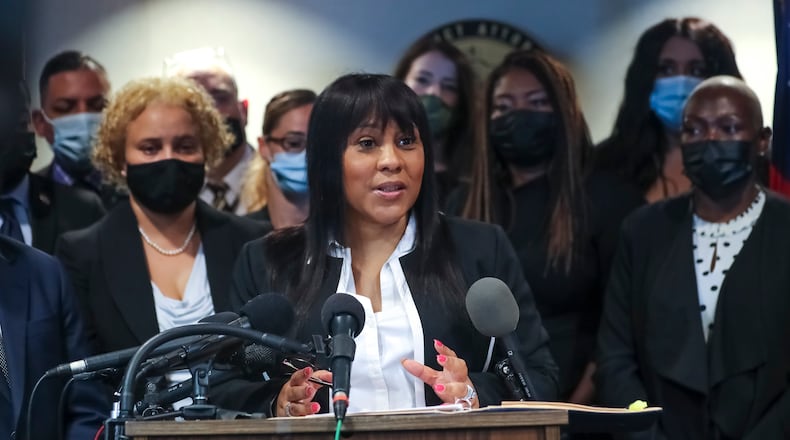The judges on Fulton County’s Superior Court bench on Monday cleared the way for a special grand jury to be used for District Attorney Fani Willis’ investigation of former President Donald Trump and his efforts to overturn Georgia’s 2020 election results.
Chief Judge Christopher S. Brasher wrote that a majority of the judges had agreed to the request issued by Willis’ office late last week.
The special grand jury will be impaneled May 2 and can continue for a period “not to exceed 12 months,” Brasher wrote in an order.
“The special purpose grand jury shall be authorized to investigate any and all facts and circumstances relating directly or indirectly to alleged violations of the laws of the State of Georgia,” Brasher wrote.
Willis’ criminal probe, launched nearly a year ago, is centered on the Jan. 2, 2021, phone call that Trump placed to Secretary of State Brad Raffensperger, in which he urged the Republican to “find” the 11,780 votes to overcome Joe Biden’s win here.
The veteran prosecutor has indicated that her team is also examining the abrupt resignation of former Atlanta-based U.S. Attorney BJay Pak; a November 2020 call U.S. Sen. Lindsey Graham, R-S.C., placed to Raffensperger; and false claims made by Trump attorney Rudy Giuliani during a hearing before the Georgia Senate Judiciary Committee.
Willis previously told state officials that her office was probing potential violations of Georgia law including criminal solicitation to commit election fraud, intentional interference with the performance of election duties, conspiracy and racketeering, among others.
Willis previously argued that appointing a special grand jury was necessary because a “significant number of witnesses and prospective witnesses have refused to cooperate with the investigation absent a subpoena requiring their testimony.” That includes Raffensperger, she said, who would presumably be the case’s star witness.
For his part, Raffensperger insisted that his office has been cooperative and slammed Willis, a Democrat, for trying to score political points. Despite that, he vowed during an interview on Fox News last week to “follow the law and come before a grand jury and testify.”
Special grand juries, which include 16 to 23 people, are rare in Georgia. They can’t issue indictments but can subpoena witnesses and compel the production of documents and information. Unlike regular grand juries, they can be seated for longer than two months and are focused on a singular topic rather than many.
At the end of their service, special grand juries file a report of their findings and sometimes recommend a course of action. If prosecutors ultimately want to seek an indictment, they’d need to present evidence to a regular grand jury.
A spokesperson for Willis did not immediately respond to a request for comment about next steps. But the selection process for jurors is expected to be similar to that of regular grand juries, and the proceedings done in secret.
Some legal observers believe that a special grand jury could benefit Willis given the complexity of the case.
“Special grand juries do have the capacity to streamline investigations,” said Norman Eisen, President Barack Obama’s ethics czar who recently co-authored a report assessing Trump’s legal risk for the Brookings Institution think tank. “You don’t have to reteach the case to each successive regular grand jury.”
Should a case against Trump move forward, his lawyers are expected to fight every request made by prosecutors, which could drag out the investigative process for months or longer.
A spokesperson for the former president did not immediately respond to a request for comment Monday. Trump last week called his phone call to Raffensperger “perfect” and said that a special grand jury should instead be looking at “the large scale voter fraud that took place in Georgia,” a falsehood that’s been proven wrong by three ballot counts and multiple investigations that found no evidence of a coordinated effort to change votes.
Brasher noted that Judge Robert C.I. McBurney, who’s been on the court for a decade, has been assigned to supervise the special grand jury and receive its reports. McBurney is a former prosecutor for the Fulton DA’s office and for the U.S. Attorney’s Office in Atlanta.
Willis recently said that a decision on whether to bring charges against Trump could come in the first half of 2022.
“We’re going to just get the facts, get the law, be very methodical, very patient and, in some extent, unemotional about this quest for justice,” she told The Associated Press earlier this month.
Fulton prosecutors are sharing information with investigators in New York and on Capitol Hill, where Trump is facing other local, state and federal probes.
Willis faces critics who believe the DA’s office should focus its limited resources on clearing the 11,000-case backlog of criminal cases created by the COVID-19 pandemic rather than chasing Trump.
Brasher said that impaneling a special grand jury will free up Fulton’s two regular grand juries to focus on that backlog.
Staff writer Bill Rankin contributed to this article.
About the Author
The Latest
Featured



